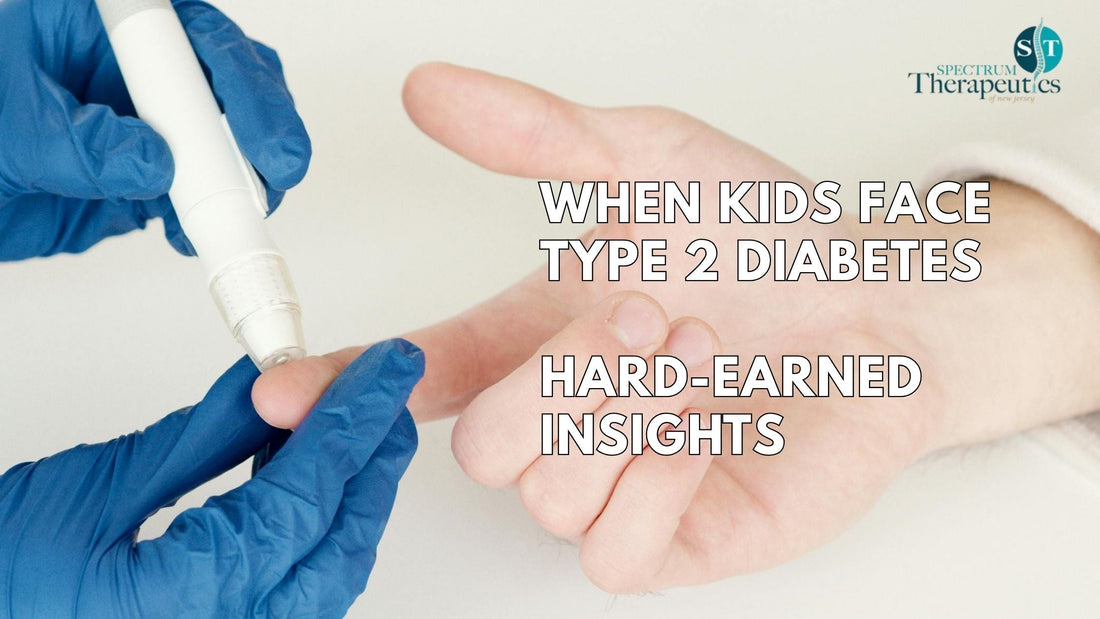
When Kids Get Type 2 Diabetes: What I've Learned in 15 Years of Practice
Dr. Rob Letizia PT, DPTShare
Something happened last month that I can't shake. I was working with an 11-year-old girl, let's call her Emma, who came in for what her mom thought was just fatigue from school stress. By the end of our session, I was recommending they see their pediatrician immediately. Two weeks later, Emma was diagnosed with type 2 diabetes.
Emma wasn't my first case like this. She wasn't even my tenth. And that's what keeps me up at night.
The Numbers That Made Me Do Research
I'll be honest, I'm not someone who usually dives deep into medical literature outside my field. But after seeing more kids like Emma, I had to understand what was happening. What I found made my stomach drop.
The CDC has been tracking this through something called the SEARCH for Diabetes in Youth Study. Their 2017 data showed type 1 diabetes in kids was going up about 1.8% each year from 2002 to 2012. That's concerning, but type 1 is largely genetic, there's not much we can prevent there.
But type 2? That was climbing 4.8% annually. We're talking about a disease that used to be called "adult-onset diabetes" because we literally never saw it in children.
Then COVID hit, and everything got worse. A study published in 2022 found that new type 2 diabetes cases in kids jumped 77% during 2020 alone. Some hospital systems saw increases over 200%.
These aren't just numbers on a page, they're kids like Emma.
What's Really Happening
I started paying closer attention to the families I work with, and some patterns became impossible to ignore.
The food situation is honestly pretty dire. I read a study showing that by 2018, ultra-processed foods made up 67% of what American kids were eating. That's stuff like chicken nuggets, fruit snacks, flavored yogurts, breakfast cereals, things that barely resemble actual food once you look at the ingredient list.
Physical activity has tanked too. Less than a quarter of kids get the recommended hour of activity daily. I see this firsthand, parents tell me their kids come home from school and go straight to screens until bedtime.
And here's something that really bothers me: the kids most at risk are often from families with the least resources. When healthy food is expensive and your neighborhood doesn't have safe places to play, the deck is already stacked against you.
What I Tell Families Now
After diving into the research and reflecting on what I've seen work, I've changed how I talk to parents. Instead of generic "eat better, move more" advice, I focus on specific changes that studies show actually make a difference.
Start with drinks. This is the easiest win. A 2019 study found that just removing sugary drinks and replacing them with water cut kids' daily sugar intake by 15-25% within two weeks. In my experience, this single change often leads to noticeable energy improvements within a month.
Make movement non-negotiable. I don't tell families to join gyms or buy equipment. I tell them to pick 30 minutes every day where the whole family moves together. Walk the dog, dance to music, play tag, whatever works for your family. Research backs this up: kids who do structured physical activity with their families have significantly better blood sugar control.
Clean out your pantry gradually. I learned this from a family who completely overhauled their eating in one weekend and then fell off the wagon within a month. Instead, I suggest the "five-ingredient rule." If a packaged food has more than five ingredients, or if you can't pronounce most of them, replace it with something simpler when you run out.
The Real Cost
The American Diabetes Association says treating a child with type 2 diabetes will cost over $300,000 over their lifetime. But the human cost is what really gets to me.
I've now worked with teenagers who already have early signs of complications that used to show up in 50-year-olds. Nerve damage, vision problems, kidney issues. Emma's mom asked me if her daughter would be able to have normal pregnancies someday. I didn't know what to say.
My Challenge to Parents
Look, I'm not trying to scare anyone or make parents feel guilty. But I am asking you to take this seriously.
This week, pick one thing:
- Go through your pantry and replace the worst offenders with simpler alternatives
- Institute a daily 30-minute family walk after dinner
- Make water the default drink in your house
That's it. Don't try to change everything at once.
Why This Matters So Much
I've been doing this job for 15 years, and I've never seen anything like what's happening with kids' health right now. We're potentially looking at the first generation that might live shorter lives than their parents because of preventable diseases.
But here's the thing, it is preventable. The research is clear, and the interventions aren't complicated or expensive. They just require us to prioritize our kids' long-term health over short-term convenience.
Every family I work with who makes these changes sees improvements. Not just in blood sugar, but in energy, mood, sleep, and overall wellbeing.
Emma's family, by the way, has made incredible changes since her diagnosis. Her latest A1C numbers are looking much better, and her mom says she has more energy than she's had in years. It gives me hope.
We can turn this around. We just have to decide to do it.
Dr. Rob Letizia practices physical therapy at Spectrum Therapeutics in Wayne, New Jersey, and hosts The Art of Recovery Podcast. If you have concerns about your child's health, please consult with their pediatrician.
This article is for educational purposes only and is not medical advice. Always consult with qualified healthcare providers for medical concerns.



